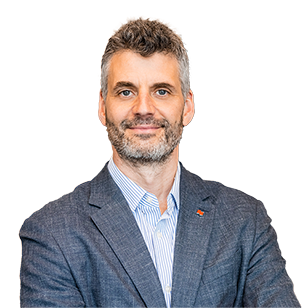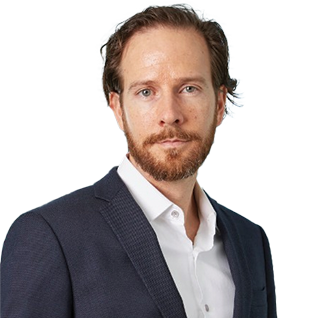Martin Lefebvre:
Hi everyone. Welcome and thank you for tuning into our NBI podcast series. I'm Martin Lefebvre, Chief Investment Officer and Strategist at National Bank. Today, our guest is Jean-David Meloche of Montrusco Bolton. Jean-David is the head of global equities for the firm. He is manager for the NBI Active U.S. and International Equity ETFs; NUSA and NINT as we call them. He initially joined Montrusco Bolton in January 2005 as an equity analyst covering the financial sector and Jean David is also a CFA charter holder. Welcome Jean David.
Jean-David Meloche:
Hi, happy to be here.
Martin Lefebvre:
All right, so Jean-David, given that Earth Day is on April 22nd, we wanted to shift our discussions on a topic that has been top of mind recently and evolving very rapidly lately. That is environment, social and government issues or ESG consideration as they've become to be known. So, first question for you in your opinion, how do ESG factors influence investment decisions and portfolio construction? And what are some of the best practices leading them into investment philosophies.
Jean-David Meloche:
So, a few ways. The first aspect is that it actually shapes our investable universe, both through the exclusion of companies that, for example, make products that harm societies, think different types of weapons, but also the investable universe shaped from our internally developed scoring system. So, we seek to determine whether a business model is investable or not following our process, which is applying scoring companies and that will determine if it scores sufficiently high to be within our investable universe. Second, the impact on our portfolio is through ongoing actions. We always raise the bar which regards to our sustainability criteria and of course companies take decisions a perception of their “investability” over time. So, every year we've sold companies purely based on our scoring system. So, a company is no longer investable, they've done something which is unacceptable for us. Or there's just some slippage, they fail to keep up with their peer group and all of a sudden, they just fail our score, become there again, un-investable. And lastly ESG considerations will affect our perception of the evolution other companies risk profile. And sometimes potential inflection points in growth drivers. Think about potential changes to legislation or just basic global warming. So, when I talk about legislation, say legislation around a carpet footprint and the cost attached to it. And then basic global warming will affect most business models over time. So that will affect as well our perception of companies.
Martin Lefebvre:
Good. Do you have any examples? Who's the champion in ESG considerations? You talked about evolving practices. Can you name a few companies that have changed their practices to focus more on those criteria?
Jean-David Meloche:
I mean, I think we've seen broad improvement in management team sensitivity and incorporation of investors ESG related concern. One example would be actually quite recently or on a continuous basis. Adidas has been changing. So, Adidas makes shoes I use because it's a consumer discretionary and therefore everyone's kind of familiar with the company. They change their supply chain. They focused on ethical sourcing of raw materials. materials and making efforts to incorporate recycled materials into end products. We're not necessarily looking for the prettiest company, the company that scores highest. It just determines our investable universe and it drives our engagement practice with management teams. And yeah, so quick answer to your question. One example would be Adidas, just a newfound focus on ethical sourcing of raw materials and incorporating recycled materials into the end
Martin Lefebvre:
Okay, you talked to a lot of CFOs and CEOs. So how can you help companies improve their ESG performance and reporting? How is that important to you in your practice?
Jean-David Meloche:
So, it's very important for us and the way corporations or our company as well. So, it's same as any institutional, public, private government. You need obvious buy-in from senior management. You need continuous training at all levels. And if you're starting from a low level, you need to hire thought leaders to build your knowledge base. You need to put together incentives to reward great initiatives. to reward great results. And then you have to apply your ESG knowledge and values to changing the way you do business.
Martin Lefebvre:
Okay, and if we address the reporting issue a little bit more, what type of metric do you specifically look for?
Jean-David Meloche:
Yeah, so things that are very quantifiable would be, we of course pay attention to the carbon intensity. Let's go one, two, three for those that are there. We will look at so many criteria. So, think about the percentage of women in senior leadership positions. Think about the percentage of women on company boards as well. So, these are easy to quantify. Think about water usage and targets in terms of water usage per dollar of revenue. energy usage. So, a lot of things can be quantified and therefore can be compared across subsectors, sectors, industries, general economy and it helps us pick the companies and it helps us engage on companies that are perhaps a bit weaker and perhaps you know sometimes they're not aware so a great source of engagement potential for us.
Martin Lefebvre:
As I mentioned in the introduction, ESG consideration have been evolving very, very rapidly as of late. And do you think that eventually it'll become the industry standard? What type of trends are you seeing in the near future?
Jean-David Meloche:
Yeah, we see more and more focus on climate impacts, perhaps with specific targets from asset owners who are also getting involved. We have more precise, or we hope for more precise commitments are clearly defining how long-term targets can truly be reached. So, we've had a wave of target setting. So, if you take CO2 footprint, a lot of by 2050, we expect to be zero carbon. But what we hope for and where we see a current trend is just detailing that. You know, what technology are you relying on? How do you get there? A bit more steps, a bit more clarity is a trend that we were hoping for and that we're seeing across the board.
Martin Lefebvre:
Okay, and in terms of specific sectors or industries, which of those do you see benefiting the most from these trends?
Jean-David Meloche:
Um, I guess for a while we've seen... We've seen the prettier industry segments benefiting most if you think about investor appetite. And again, if we take carbon intensity, for example, there's currently a really high demand for investments that rapidly improve portfolio characteristics, such as lowering the carbon footprint. It's a lot easier to sell a high-carbon footprint business model and buy a low-carbon footprint business model than it is to engage in raising the sustainability, for example, to the carbon profile. the companies that you're currently invested in. So, the near term or the recent sectors that have benefited is really companies that by their operations or by the type of business they're in are seen positively. And that immediately selling something that seems a bit dirty, high-carbon footprint, just a business model that uses a lot of energy. So, we see a lot of switching. And what I'd love to see in the future is just, hang on. it takes all sectors for the economy to move forward. And our favorite approach is engaging with, yes, of course the prettiest company that do solar panels and things like that, but also the trucking company. I mean, for a solar panel to have any use, you need to put it on a flatback drive, the Bernstein diesel and take it to a location where it can have some use. And so we try to avoid just investing directly in companies that already have carbon footprint and getting that diversified portfolio, recognizing that the economy is a form of balancing act, that it's complex, that it's intricate. And we hope that in the future you have a lot of ESG sensitive assets that remain invested in the companies that, by their nature, again, have a high carbon footprint and help them along, think about ways to improve for pressure there as well to move things along. So short question to your short answer to your question is really a lot of the early benefits came from access demand for prettier business model, low carbon intensity segments and I hope that the trends move towards a broader swath of the economy where there again pressure can be applied it's just not a quick fix to portfolio statistics.
Martin Lefebvre:
Yeah, these companies are already the best. So, I guess you're looking to invest more in those that are improving. If we turn our focus to investors, and you talked about some of the companies being the best, but when we look at some companies, whether electric vehicles, not to name those, some say that they're good for the environment, some say that they're big polluters because of the rare earth metals that they're, you know, they're part of the integration. So, what, what should investors be considering when they're evaluating ESG performance?
Jean-David Meloche:
I think there are many good ways. The way we approach it is through an appreciation of a business model's impact on people, society, the planet, governance. We pay a lot of attention to disclosure, and that's very important to us. We pay attention to a number of criteria within operations, productivity, the partnerships that companies put together. And in those segments, again, we study 53 criteria. We engage with the management team where we see potential for improvement. If a company is already doing something exceedingly well, not something we'll bring up, we'll move to the criteria where there's perhaps more work to be done. We're never approaching this from a moral high ground. How dare you not calculate your CO2 footprint? It's really from understanding the value chain of the business and thinking of or sharing what other companies have done. within their environment, perhaps companies that they have ties with, and just, I guess, putting our shoulders to the wheel and trying to help management of companies that we're invested in for the long term. And, yeah, use all of the criteria, all of the, I guess, depth of expertise and experience that we have, and spark ideas with when we're interacting with management teams.
Martin Lefebvre:
Jean-David, you talked about the trends in the industry, but what about investors' attitudes towards ESG investing? What sort of key trends are you seeing, and is it becoming more and more popular, or is something that is just good to have a discussion once in a while?
Jean-David Meloche:
No, I think it is becoming more popular. A few years ago in many markets, ESG was viewed with suspicion. Is the portfolio manager sacrificing investment return to chase nebulous benefits that a client perhaps can't see or measure? And that was worrying to a lot of clients. I don't think clients need to sacrifice performance to invest more sustainably. I think there will be constant debate over ESG criteria and corporate engagement benefits. And there's always criticism with regards to potential greenwashing or whether a manager is fulfilling his fiduciary duties when he's paying so much attention to broader issues. And I think all of that's healthy. I think asking more questions is always a good trend. I also think more legislation will improve in a way the debate's framework, making it easier to understand for most clients. But yeah, there's been a massive shift in attitude from, this is something that's costing me to, you know, this is something that might be, you know, accretive to both performance and at the same time, making the world a better place. And so, I think that's a great question. I think that's a great question. I think that's a great question. I think that's a great question. I think that's a great question.
Martin Lefebvre:
So, if I understand correctly what you're saying, you don't need to be benchmark agnostic anymore to go for ESG considerations.
Jean-David Meloche:
Absolutely not.
Martin Lefebvre:
Okay, so are these trends likely to shape the future of the investment industry? Do you think that eventually ESG will be the standard? Like everybody will do it or?
Jean-David Meloche:
I think the industry will remain diversified in its sustainability approach. And, you know, some of that diversification will come from firms and, you know, asset owners that shy away from that type of responsibility. I think that legislators will need to offer smart, clear and evolving standards for both and investment firms, and hopefully that spans, in a hopefully uniform way, that spans as many geographies as possible. And yeah, so I think that'll be the upcoming changes in our investment industry.
Martin Lefebvre:
Do you find that Canada is sort of stuck between a rock and a hard place? You know, we welcome everything that's coming from Europe, but then we're also a big oil producer and our neighbor to the south of the United States is seeing this sort of a woke strategy, not to name that, but what's your take on that?
Jean-David Meloche:
Yeah, the US is not monolithic. It's in its approach. You have states that are taking a stance that are pushing back. And there are usually idiosyncratic reasons within those states. And then there's the overarching political partisan concept. But I agree with you. I think Canada is moving closer to more legislation and more clarity. And that'll be most welcome. But of course, a lot of nations that have... a lot of oil are sensitive to the economic well-being of their different regions. And I think that's healthy, so the debate is ongoing. But yes, we are moving a bit more slowly than some countries that don't have that interest group.
Martin Lefebvre:
I guess this is a good segue to my next and probably last question. Are there any potential challenges associated ESG investing that investors should be aware of?
Jean-David Meloche:
Very many. I worry about a form of fashion risk where clients are investing in ESG focused products that may not reach the client's return requirement and that would generate disappointment and a backlash against sustainable investing. So I worry about that a lot. In part because I find that identifying sustainable business models out there does not require as much skill as outperforming benchmarks on a sustainable risk adjusted basis. So I always want, you know, which is why legislation is so important to underline responsibilities and make sure that products are suitable for the client base and that Yeah, so clarity is important and we wouldn't want a pushback. I think investing sustainably does not have to cost performance and I think it is part of the responsibility of the asset owner to take that into account in their overall investment and in their overall values. There is an impact and so more information, more transparency, more legislation around transparency can only help sustainability over the long term and avoid pushbacks that we are seeing in a number of geographies.
Martin Lefebvre:
Thank you so much for being our guest today. Everyone, thank you very much. Jean-David Meloche is the head of Global Equities for Montrusco Bolton Investment. Thank you very much for tuning into this NBI podcast series, and we will talk again next month.
Jean-David Meloche:
Appreciate the questions. Thank you so much.


 Martin Lefebvre
Martin Lefebvre

 Jean-David Meloche
Jean-David Meloche
